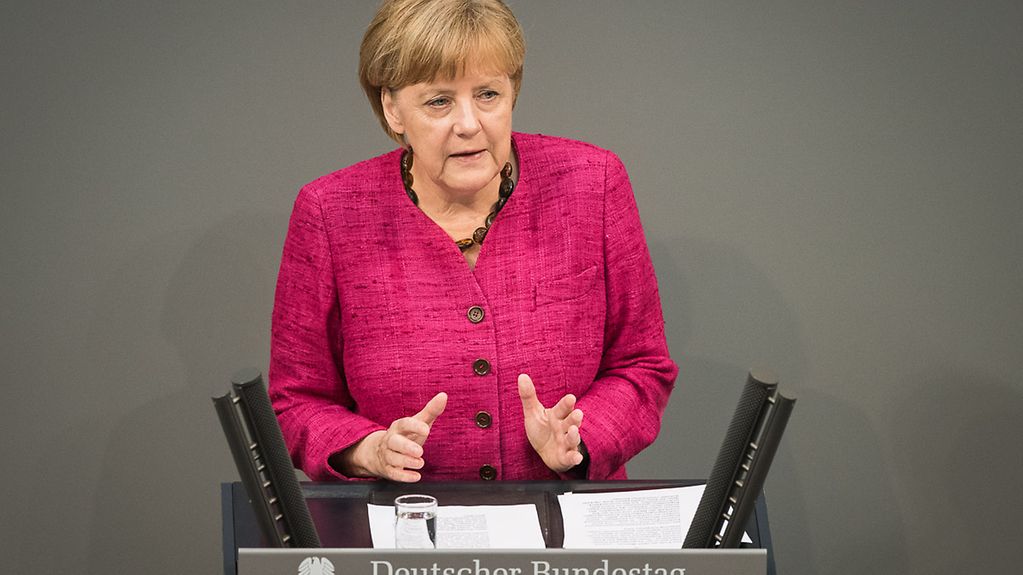Chancellor's government statement
Speaking in the German Bundestag, the Chancellor has explained the decision of the German government to supply weapons to Iraqi Kurds to help them in their fight against the group calling itself Islamic State (IS). "It is not only a question of alleviating the suffering of the people, but of preventing this suffering," she said.
3 min reading time

"The IS falls within our field of responsibility."
Photo: Bundesregierung/Kugler
The IS militants are destabilising the entire region, with impacts on Germany, said Chancellor Angela Merkel.
A stop must be put to the spread of IS terror, declared the Chancellor, explaining the decision to supply weapons to the Kurds in Iraq, as the country faces a humanitarian disaster. A meeting of ministers chaired by Angela Merkel decided on Sunday evening to supply arms to the Kurds in northern Iraq. This is to support them in their fight against the terrorist militants of the Islamic State (IS).
"We have seen acts of unbelievable brutality," said Angela Merkel. IS is not only a threat to minorities. Everybody who stands up to the Islamic State must fear the worst. "The IS proceeds with inconceivable brutality."
The Chancellor reminded members of the German Bundestag that the very existence of the Yazidi community was jeopardised by the ‘cleansing’ of the IS, and that it was the Kurdish forces which had finally intervened to prevent this.
In her government statement to the German Bundestag Angela Merkel also pointed to Germany’s special responsibility, having triggered the Second World War with an attack on Poland 75 years ago.
The conflict in eastern Ukraine today confronts Europe once again with a situation in which existing borders are to be changed by military force. "Russia is attempting to modify existing borders with the threat of force or even the use of force."
Alleviating suffering – focus on the humanitarian situation
The humanitarian situation is the focus of aid for Iraq. The Chancellor stressed that the desperation of more than one million refugees must be recognised. "We have flown more than 150 tonnes of supplies to Erbil. Germany has provided or pledged humanitarian aid worth more than 50 million euros. We must not leave Iraq alone with its problems," urged Angela Merkel in the German Bundestag.
In August the German government declared its readiness to provide arms, in addition to humanitarian aid supplies and equipment such as helmets and flak jackets. Federal Foreign Minister Frank-Walter Steinmeier explained this step. "All these supplies aim to enable Kurdish security forces to defend themselves against the IS attacks."
Preventing suffering – arms for the Kurds
At the same time Angela Merkel stressed the need for further comprehensive aid in addition to the humanitarian measures. It is quite clear to the German government that no conflict in the world can be resolved with military means. Nevertheless it is equally clear that in some cases only military intervention can make a political solution possible. "Every conflict has its own nature," underscored the Chancellor.
The Peshmerga fighters are facing enormous risks to achieve something that is also in the interests of Germany, said Angela Merkel. On a limited scale and in close consultation with international partners the German government is thus willing to provide weapons and ammunition for the fight against the IS militants.
IS a threat to German security interests
"A destabilisation of an entire region on this scale impacts on Germany and on Europe too," said Angela Merkel. If a basis is created for religious fanatics, as is the case in Iraq, "the risk that our security interests will be compromised also increases".
Strengthening Iraq at political level
The Chancellor stressed that the supply of arms has been agreed with Iraq’s central government. This makes it clear that the German government is not interested in supporting centrifugal forces in Iraq. Iraq’s government is to be supported in efforts to deal with the challenges facing it, and a process of reconciliation launched.
Far-reaching decision
Nevertheless the decision to supply arms has far-reaching implications, said the Chancellor. "We have weighed up the pros and cons very carefully, taking into account all aspects of foreign and security policy."
We were faced with a choice and we have chosen to support those who need our help. We are aware of the attendant risks, she said. "But, can we really wait and hope that somebody else will see it as his or her responsibility?"
"Now, we have the chance to help save lives and prevent any further mass murder in Iraq, and we must use this chance," summed up the Chancellor.